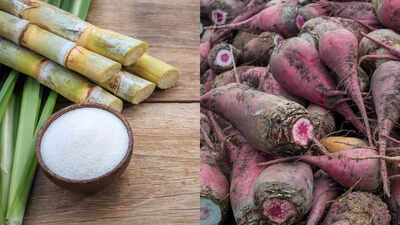Sugar beet vs sugar cane: Step-by-step look at sugar extraction
Wiki Article
The Great Debate: Sugar Beet Vs Sugar Cane - Which Is the Superior Choice for Sweeteners?
The debate over sugar beet versus sugar cane as the recommended sugar includes numerous crucial factors. Each offers distinctive benefits and obstacles pertaining to manufacturing, flavor, and health implications. While sugar beet might attract those prioritizing sustainability, sugar cane has its own social and culinary importance. As consumers come to be a lot more conscious of their selections, the concern remains: which sugar genuinely attracts attention in today's market?The Beginnings of Sugar Beet and Sugar Cane
Sugar cane has actually been cultivated for thousands of years, mostly in tropical regions, sugar beet emerged as a considerable choice in cooler environments during the 18th century. Sugar cane, indigenous to Southeast Asia, was first tamed around 8000 BCE and spread out globally via trade and exploration. Its high sucrose content made it a valuable plant, leading to extensive plantations in areas like the Caribbean and Brazil.In contrast, sugar beet was initial cultivated in the Mediterranean around the 18th century, especially obtaining traction in Europe as a response to sugar cane lacks. The plant grows in warm environments, making it ideal for areas with cooler weather. The exploration that sugar can be drawn out from beet origins changed sugar production, particularly throughout the Napoleonic Battles when trade constraints limited cane sugar gain access to. The surge of sugar beet cultivation marked a zero hour in the history of sugar, providing a regional resource for several nations.
Production Processes: From Area to Sugar
The manufacturing processes of sugar beet and sugar cane disclose significant distinctions in farming strategies, harvesting methods, and improvement stages. Comprehending these subtleties is important for appreciating exactly how each plant adds to the general sugar market. This contrast highlights the special features and challenges associated with both sources of sweetness.
Farming Techniques Contrast
Cultivation strategies for sugar beet and sugar cane expose distinctive approaches that influence their production procedures, from field prep work to last sugar removal. Sugar beet farming generally involves plowing and painful to produce a great seedbed, adhered to by seeding in rows to promote development. This plant take advantage of cooler environments and is usually grown in spring. In comparison, sugar cane is generally planted in furrows with pre-sprouted cane pieces, needing a cozy, tropical environment for excellent development. Cane areas are typically outlined to handle water successfully, provided its need for substantial watering. Both plants are managed with details fertilizing and bug control techniques customized to their development atmospheres, impacting return high quality and efficiency in sugar removal.
Gathering Techniques Discussed
Effective harvesting approaches for sugar beet and sugar cane play a crucial role in guaranteeing maximum yield and top quality of the end product. Sugar beet harvesting usually utilizes mechanized origin harvesters, which efficiently root out the beets from the soil and separate them from the vegetation. This method minimizes damages to the beets and minimizes labor prices. On the other hand, sugar cane harvesting might use either manual work or equipment, depending upon the area and range of manufacturing. Mechanical harvesters reduced the cane at the base and typically strip away the leaves, maximizing the procedure for larger areas. Both approaches call for cautious timing to guarantee the plants are harvested at peak sweetness, affecting the quality of the final sweetener product.Refinement Process Distinctions
While both sugar beet and sugar cane go through extensive refinement processes to change their raw forms into useful sweeteners, the approaches employed differ considerably. Sugar beet improvement starts with washing and cutting the beetroots into slim cossettes, complied with by diffusion, where warm water extracts sucrose. The resulting juice is then detoxified, concentrated, and taken shape. On the other hand, sugar cane processing entails crushing the stalks to extract juice, which is after that cleared up using lime and warm to get rid of impurities. The cane juice is evaporated to develop syrup prior to condensation. Ultimately, while both processes aim to create white sugar, the distinctive techniques highlight the special attributes of each resource and their implications for flavor and pureness in the end product.Nutritional Profiles: What's in Your Sweetener?
The nutritional profiles of sugar beet and sugar cane existing unique distinctions worth analyzing. This comparison consists of facets such as calorie web content, mineral and vitamin presence, and variations in glycemic index. Understanding these elements can give understandings into exactly how each sweetener might influence total health and wellness.Caloric Web Content Comparison
Recognizing the calorie web content of sugar beet and sugar cane is essential for those conscious of their dietary selections. Both sweeteners largely include sucrose, adding a similar caloric worth. Generally, sugar beet contains about 387 calories per 100 grams, while sugar cane has about 390 calories per the very same amount. The minor difference in calorie web content might not considerably influence most diets; nevertheless, it is amazing for those very closely checking their calorie consumption. In addition, both sugar resources offer energy however do not have important nutrients, making them mostly sources of empty calories. Subsequently, individuals seeking healthier choices might intend to take into consideration these aspects when selecting in between sugar beet and sugar cane as their liked sweetener.
Mineral and Vitamin Material
Calorie content supplies just a part of the photo when assessing sugar beet and sugar cane. Both sources of sugar differ markedly in their mineral and vitamin accounts. Sugar beets are incredibly abundant in essential nutrients, including potassium, magnesium, and iron. They also include percentages of vitamins such as B6 and folate, contributing to their nutritional worth. On the other hand, sugar cane supplies a different collection of advantages, having calcium, phosphorus, and traces of B vitamins. While neither choice is see page a significant resource of minerals and vitamins compared to entire foods, sugar beetroots may have a mild edge because of their greater mineral material. Inevitably, customers looking for dietary gain from sweeteners must think about these distinctions in accounts.Glycemic Index Distinctions
Glycemic index plays an important role in reviewing just how various sugar influence blood sugar level degrees. Sugar beet and sugar cane show notable differences in their glycemic reactions. Typically, sugar beet has a lower glycemic index compared to sugar cane, resulting in a slower and steadier increase in blood glucose levels after usage. This quality may make sugar beet a more suitable option for individuals handling diabetic issues or those seeking to maintain secure power levels. In contrast, sugar cane often tends to trigger a much more fast spike in blood glucose, which might result in quicker energy crashes. Comprehending these differences is considerable for consumers intending to make educated nutritional selections pertaining to sugar and their influence on overall wellness.Ecological Impact: Sustainability Considerations
While both sugar beet and sugar cane are necessary sources of sugar, their ecological effects and sustainability considerations vary substantially. Sugar beets, mainly grown in warm find here regions, usually need much less water and can be grown in diverse environments. They additionally take advantage of crop turning techniques, which boost soil health and lower the demand for artificial fertilizers. Nevertheless, extensive farming of sugar beetroots can bring about soil exhaustion and pesticide usage.In comparison, sugar cane prospers in tropical climates and usually necessitates significant water sources for watering (Sugar beet vs sugar cane). The monoculture nature of sugar cane farming can intensify dirt erosion and biodiversity loss. Additionally, the burning of cane areas prior to harvest releases carbon exhausts and adds to air pollution. Both plants deal with challenges associated to environment change, however their varying cultivation methods profoundly affect their total sustainability profiles. The option in between sugar beet and sugar cane entails weighing these environmental influences carefully.
Taste and Culinary Utilizes: Which Sweetener Reigns Supreme?
The option in between sugar beet and sugar cane expands beyond environmental factors to consider to incorporate preference and cooking applications. Sugar beet, frequently viewed as having a slightly different flavor profile, tends to be less wonderful than sugar cane. This subtle difference can influence its usage in dishes, especially in baked products where a neutral sweet taste is preferred.Alternatively, sugar cane is celebrated for its unique, abundant, and a lot more complicated taste, making it a favored option for beverages and desserts - Sugar beet vs sugar cane. Its all-natural molasses web content can boost the deepness of tastes in different meals
In food preparation, sugar cane's convenience shines through in marinades, lusters, and confections, while sugar beet is generally located in refined foods and sugar like granulated sugar. Eventually, the decision between both sugar often rests on private taste preferences and particular culinary applications, with each offering one-of-a-kind advantages in the kitchen.
Health Ramifications: Sugar Beet Vs Sugar Cane
Both sugar beet and sugar cane have unique health effects that can affect customer selections. Sugar beet vs sugar cane. Sugar beet is typically regarded for its higher fiber content, which can help digestive system wellness. Additionally, it contains specific anti-oxidants that might add to general wellness. On the other hand, sugar cane is rich in nutrients such as calcium, potassium, and magnesium, providing some mineral benefitsHowever, both sources mostly contain sucrose, which can lead to similar health problems when taken in excessively, such as obesity, diabetes mellitus, and cardiovascular disease. The processing approaches likewise differ; sugar beet is typically improved much more intensively, possibly resulting in a loss of specific nutrients. Consumers concerned regarding ingredients may like sugar cane, as it frequently undertakes much less processing. Ultimately, comprehending these health effects can direct people towards making notified choices concerning their sweetener options.
Customer Preferences: Fads and Insights
Customer preferences for sweeteners have actually evolved significantly recently, affected by health fads, ecological issues, and dietary choices. Enhanced understanding of the negative health and wellness effects connected with excessive sugar intake has led numerous consumers to look for choices. This shift has actually triggered a growing interest in natural sugar, with sugar resource beet and sugar cane going to the leading edge of conversations.Research indicates that consumers are progressively preferring sugar beet because of its perceived ecological advantages, as it is typically expanded closer to processing plants, decreasing transportation discharges. On the other hand, sugar cane is commonly related to exotic regions and might lug assumptions of sustainability challenges.

Often Asked Inquiries
Just How Do Sugar Beet and Sugar Cane Affect Blood Sugar Level Levels?
Sugar beet and sugar cane both contain sucrose, which can raise blood glucose levels. The influence greatly depends upon individual metabolism and consumption quantities, yet both sources contribute in a similar way to blood sugar feedbacks most of the times.Which Sugar Is Better for Baking and Cooking?
When examining sweeteners for baking and cooking, one must think about texture, taste, and wetness retention. Sugar beet and sugar cane both supply unique high qualities, with sugar cane commonly chosen for its richer taste profile in cooking applications.Can Sugar Beet or Cane Be Utilized in Vegan Diets?
Both sugar beet and sugar cane can be used in vegan diet regimens. They are plant-derived sugar, making them ideal for people looking for vegan-friendly choices without pet items, making sure honest choices in their culinary methods.What Are the Historic Usages of Sugar Beet and Cane?
Historically, sugar beet and cane functioned as crucial resources of sweetness, with cane grown in tropical areas and beet in warm zones. Both have been indispensable to different societies, economic situations, and cooking customs throughout history.Exist Any Kind Of Alternatives to Sugar Beet and Cane?
Alternatives to sugar beet and cane include agave nectar, honey, syrup, and synthetic sugar like aspartame and sucralose. These alternatives supply differing tastes and wellness advantages, interesting varied nutritional preferences and limitations.Report this wiki page